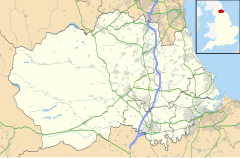Haswell, County Durham
| Haswell | |
|---|---|
 St Paul's Parish Church, Haswell | |
 Haswell Location within County Durham | |
| Population | 1,831 (2011)[1] |
| OS grid reference | NZ375433 |
| Unitary authority | |
| Ceremonial county | |
| Region | |
| Country | England |
| Sovereign state | United Kingdom |
| Post town | DURHAM |
| Postcode district | DH6 |
| Dialling code | 0191 |
| Police | Durham |
| Fire | County Durham and Darlington |
| Ambulance | North East |
| UK Parliament | |
Haswell is a village in County Durham, in England. It is situated 6 miles (9.7 km) east of the city of Durham, 9 miles (14 km) south of the city of Sunderland and 3.1 miles (5.0 km) north-west of the town of Peterlee.
It is notable as the birthplace of English world champion road racing cyclist Tom Simpson, born 30 November 1937, who died aged 29 on Mont Ventoux during the 1967 Tour de France.
It was also the home of the first coal mine in the world with a steel cable down its mine shaft.
Discovery of coal[]
The Anglo-Saxon roots of the former farming community of Haswell are apparent in its old English name – Haesel Wella or Hessewell – meaning a hazel well or spring. Indeed, the coal trucks used at Haswell Colliery many centuries later were made of hazel bands, suggesting a hazel grove may have grown nearby. The peaceful days of living off the land disappeared in the early 19th century however, once "black gold" – coal – was discovered beneath the rural landscape.
The 1833 sinking of the first shaft at Haswell Colliery, nestled between Haswell and Haswell Plough, saw hundreds of miners from around Britain flock to the area. New houses, churches, schools, pubs and shops were all built to accommodate their needs, as well as a railway station, now long gone.
But the miners' strike of 1844, however, left the village divided. Haswell – a blackleg pit – recruited non-union staff in place of union men, causing much resentment among the locals. "Things had never been worse," recalled historian Lewis Burt in The Echo back in 1964. "Unrelenting poverty was everywhere. Barefoot children begged for bread" adding "But it wasn't only the poverty, though that was bad enough, it was the recrimination, the malice, the spite, the ill-will and the hatred."
Pit disaster[]
It took the mining accident of September 28, 1844, to reunite the village. When an explosion ripped through Haswell Colliery on that day, 95 men and boys perished. Several 10 year-olds were among the victims, including John Barrass, who was on his first visit to the pit. His father, William, also died.
"Those killed by the flame were blackened and scorched, some barely recognisable even by their nearest relations," said Mr Burt. "Those killed by choke damp showed no expression of pain. Twenty putters were found lying clasped hand in hand, huddled together in that long last sleep of death."
In Haswell's Long Row, every house except one lost loved ones. In one house, indeed, two coffins stood on the bed, one on the dresser and one on the floor. "Haswell was no longer a village of malice; it was a village of mourning. It had taken the Angel of Death to draw them together in a bond of common sympathy," said Mr Burt.
A government report was produced by Charles Lyell and Michael Faraday, after William Prowting Roberts the "miners' attorney general" held an inquest, which showed that the explosion was caused by coal dust igniting.
Mine closure[]
When the mine closed in 1895, pitmen were forced to seek work elsewhere, the station shut and the cattle market closed down.
See also[]
- Mining accidents
References[]
- ^ "Parish population 2011". Retrieved 20 July 2015.
- www.geograph.co.uk : photos of Haswell and surrounding area
- Map sources for Haswell, County Durham
External links[]
![]() Media related to Haswell, County Durham at Wikimedia Commons
Media related to Haswell, County Durham at Wikimedia Commons
- Villages in County Durham
- 1844 disasters
- 1844 in England
- Coal mining disasters in England
- 1844 mining disasters
